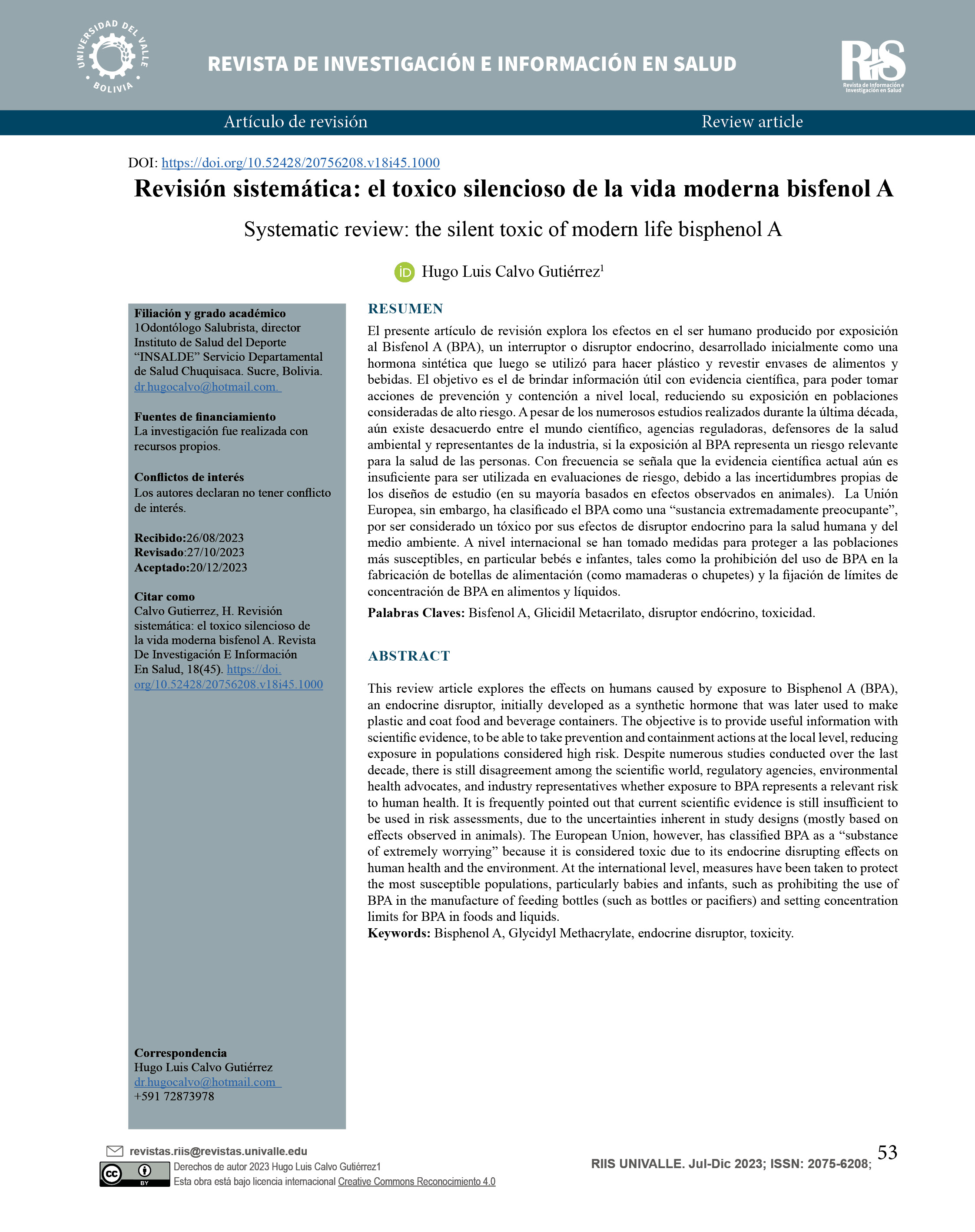Systematic review: the silent toxic of modern life bisphenol A
DOI:
https://doi.org/10.52428/20756208.v18i45.1000Keywords:
Bisfenol A, Glicidil Metacrilato, Disruptor endócrino, ToxicidadAbstract
This review article explores the various effects on humans produced by exposure to Bisphenol A (BPA), a substance that acts as an endocrine disruptor or disruptor. It was initially developed as a synthetic hormone that was later used to make plastic and cover plastic containers. Food and drinks. Polycarbonate is a type of clear, rigid plastic, made mostly of bisphenol A, that is used to make reusable water dispensers, food storage containers, and beverage bottles. It is also used to make many other objects not related to food, with which we are in contact every day, such as CDs or DVDs, glasses, car headlights, toys, etc. The objective of this review is to provide useful information and scientific evidence, to take prevention and containment actions at the local level, avoiding its exposure in populations considered to be at high risk. Despite numerous studies conducted over the past decade on Bisphenol A (BPA), there is still disagreement among the scientific world, regulatory agencies, environmental health advocates, and industry representatives, whether exposure to BPA poses a relevant risk to people's health. It is frequently pointed out that the current scientific evidence is still insufficient to be used in risk assessments, due to the uncertainties inherent in the study designs (mostly based on effects observed in animals). The European Union, however, has classified BPA as a “substance of very high concern”, as it is considered toxic due to its endocrine disrupting effects on human health and the environment (BfR, 2023b). At the international level, measures have been taken to protect the most susceptible populations, particularly babies and infants, such as the prohibition of the use of BPA in the manufacture of feeding bottles (such as bottles or pacifiers) and the setting of concentration limits for BPA in food and liquids.
Downloads
References
Wenzl, J. R. (2015). "Development and validation of a stable-isotope dilution liquid chromatography-tandem mass spectrometry method for the determination of bisphenols in ready-made meals". Journal of Chromatography A. vol. 1414, 110-121. https://doi.org/10.1016%2Fj.fertnstert.2016.07.1114
https://doi.org/10.1016/j.chroma.2015.08.037
Martín. (2008). "Toxicología del Bisfenol A" Facultad de Ciencias Exactas y Naturales.Universidad de Belgrano, 23-29.
Gibson. (2007). Biberones tóxicos. Centro de Investigación y Normas del Medio Ambiente de California, 34-42.
Guerranti. (2015). "Exposure to endocrine disruptors and nuclear receptors gene expression in infertile and fertile men from Italian areas with different environmental features". International Journal of Environmental Research and Public Health. vol. 12, nº 10,, 12426-12445. https://doi.org/10.3390/ijerph121012426 https://www.google.com/urlsa=i&rct=j&q=&esrc=s&source=web&cd=&cad=rja&uact=8&ved=0CDUQw7AJahcKEwjYjfyjnLWBAxUAAAAAHQAAAAAQAw&url=https%3A%2F%2Fwww.ncbi.nlm.nih.gov%2Fpmc%2Farticles%2FPMC4626977%2F&psig=AOvVaw0Rz9oaZwBjdJFTg_DehGX&ust=1695162963112757&opi=89978449
Wang S, et al., 2015a. Effects of bisphenol A, an environmental endocrine disruptor, on the endogenous hormones of plants. Environ. Sci. Pollut. Res Int 22,17653-17662. https://www.google.com/urlsa=t&rct=j&q=&esrc=s&source=web&cd=&ved=2ahUKEwiG6IqG3oOCAxVNGbkGHYStAyYQFnoECAsQAQ&url=https%3A%2F%2Fpubmed.ncbi.nlm.nih.gov%2F26150296%2F&usg=AOvVaw1jctrMKCzRobTtwHyM6afU&opi=89978449
Michałowicz, J. (2014). "Bisphenol A - Sources, toxicity and biotransformation."Environmental Toxicology and Pharmacology, 37(2), 738-758. https://www.google.com/urlsa=t&rct=j&q=&esrc=s&source=web&cd=&cad=rja&uact=8&ved=2ahUKEwilo_u13oOCAxVgI7kGHbwlDhcQFnoECBQQAQ&url=https%3A%2F%2Fwww.scirp.org%2F(S(vtj3fa45qm1ean45%2520vvffcz55))%2Freference%2Freferencespapers.aspx%3Freferenceid%3D2232485&usg=AOvVaw2afb_p04i7CRCalKntM7fS&opi=89978449
https://doi.org/10.1016/j.etap.2014.02.003 DOI: https://doi.org/10.1016/j.etap.2014.02.003
Rodriguez-Jorquera, I.A., Yang, Y.Y and Toor, G.S. (2015). Contaminants in the Urban Environment: Bisphenol-A. This document is SL434, one of a series of the Soil and Water Science Department, UF/IFAS Extension. Original publication date November 2015.
Yang X, Doerge DR, Teeguarden JG, Fisher JW. Development ofa physiologically based pharmacokinetic model forassessment of human exposure to bisphenol A. Toxicol ApplPharmacol. 2015; 289:442-56.
https://doi.org/10.1016/j.taap.2015.10.016 DOI: https://doi.org/10.1016/j.taap.2015.10.016
Regueiro. (2015). "Development and validation of a stable-isotope dilution liquid chromatography-tandem mass spectrometry method for the determination of bisphenols in ready-made meals". Journal of Chromatography A. vol. 1414, 110-121.
https://doi.org/10.1016/j.chroma.2015.08.037 DOI: https://doi.org/10.1016/j.chroma.2015.08.037
EFSA, Autoridad Europea de Seguridad Alimentaria. Informe resumido. Reevaluación de los riesgos para la salud pública relacionados con la presencia de bisfenol A (BPA) en los alimentos. Diario de la EFSA, 21 (4), 6857
Darío Dongo y Andrea Adelmo Della Penna (Istituto Superiore di Sanità. Exposición a disruptores endocrinos y desarrollo neuroconductual de los niños. REGALO (Gran Comercio de Alimentos Italianos). 18.3.22 https://www.google.com/url?sa=t&rct=j&q=&esrc=s&source=web&cd=&cad=rja&uact=8&ved=2ahUKEwiu3b3W34OCAxWuHbkGHf4wDwYQFnoECAkQAQ&url=https%3A%2F%2Fwww.greatitalianfoodtrade.it%2Fes%2Fimballaggi-e-moca%2Ftossicita-del-bisfenolo-a-efsa-dichiara-un-allarme-di-salute-pubblica%2F&usg=AOvVaw1fIK2i3HybaUxPVN4IyS9I&opi=89978449
Marta Strinati. BPA tóxico para la reproducción. El veredicto de la UE y la petición. REGALO (Gran Comercio de Alimentos Italianos). 23.6.17 https://www.google.com/urlsa=t&rct=j&q=&esrc=s&source=web&cd=&cad=rja&uact=8&ved=2ahUKEwjNpt_u34OCAxVDP7kGHYy6AMAQFnoECAgQAQ&url=https%3A%2F%2Fwww.greatitalianfoodtrade.it%2Fes%2Fimballaggi-e-moca%2Ftossicita-del-bisfenolo-a-efsa-dichiara-un-allarme-di-salute.
Vogel. (2009). The politics of plastics: The making and unmaking of Bisphenol A "safety". Journal of public health, 559-567.
https://doi.org/10.2105/AJPH.2008.159228 DOI: https://doi.org/10.2105/AJPH.2008.159228
Hengstler. (2011). Critical evaluation of key evidence on the human health hazards of exposure to bisphenol A. Critical toxicology, 263-291. https://www.google.com/urlsa=i&rct=j&q=&esrc=s&source=web&cd=&cad=rja&uact=8&ved=0CDcQw7AJahcKEwiYks6anbWBAxUAAAAAHQAAAAAQAw&url=https%3A%2F%2Fwww.ncbi.nlm.nih.gov%2Fpmc%2Farticles%2FPMC3135059%2F&psig=AOvVaw338NwzluZ9BDJyoefUNyRf&ust=1695163212197917&opi=89978449 https://doi.org/10.3109/10408444.2011.558487 DOI: https://doi.org/10.3109/10408444.2011.558487
EFSA. (2023). BISFENOL A. EVALUACIÓN DE RIESGO Y REVISIÓN DE SEGURIDAD. Agencia Española de Seguridad Alimentaria y Nutrición, 1-3. https://www.google.com/urlsa=i&rct=j&q=&esrc=s&source=web&cd=&cad=rja&uact=8&ved=0CDcQw7AJahcKEwiQ7fLFnbWBAxUAAAAAHQAAAAAQAw&url=http%3A%2F%2Fwww.aesan.gob.es%2FAECOSAN%2Fdocs%2Fdocumentos%2Fseguridad_alimentaria%2Fgestion_riesgos%2Fnota_bisfenol_a.pdf&psig=AOvVaw1vJ0IkS3lCRK4e12AGQQFj&ust=1695163302666683&opi=89978449
Geens, T., H. Neels, A. Covaci. (2012). Distribution of bisphenol-A, triclosan and nnonylophenol in human adipose tissue, liver and brain. Chemosphere, 87: 796-802. https://www.google.com/urlsa=t&rct=j&q=&esrc=s&source=web&cd=&cad=rja&uact=8&ved=2ahUKEwiPrtyZ4IOCAxXBIbkGHZJD14QFnoECBQQAQ&url=https%3A%2F%2Fehjournal.biomedcentral.com%2Ftrack%2Fpdf%2F10.1186%2Fs12940-015-0036
Völkel. (2002). Metabolism and kinetics of bisphenol A in humans at low doses. Chemical research in toxicology, 1281-1287. DOI: https://doi.org/10.1021/tx025548t
https://doi.org/10.1021/tx025548t https://www.google.com/urlsa=i&rct=j&q=&esrc=s&source=web&cd=&cad=rja&uact=8&ved=0CDUQw7AJahcKEwiwoZvgnbWBAxUAAAAAHQAAAAAQAw&url=https%3A%2F%2Fwww.researchgate.net%2Fpublication%2F11073578_Metabolism_and_Kinetics_of_Bisphenol_A_in_Humans_at_Low_Doses_Following_Oral_Administration&psig=AOvVaw1O8q_e8SjmaUf346Xov6o3&ust=1695163358121437&opi=89978449
Mileva. (2014). Bisphenol-A: epigenetic reprogramming and effects on reproduction and behavior. International journal of environmental research, 7537-7561. https://www.google.com/urlsa=i&rct=j&q=&esrc=s&source=web&cd=&cad=rja&uact=8&ved=0CDUQw7AJahcKEwj4sYfnbWBAxUAAAAAHQAAAAAQAw&url=https%3A%2F%2Fpubmed.ncbi.nlm.nih.gov%2F25054232%2F&psig=AOvVaw2d0Djb2gBdp31TjNfg7bq3&ust=1695163420373774&opi=89978449 https://doi.org/10.3390/ijerph110707537 DOI: https://doi.org/10.3390/ijerph110707537
Alonso-Magdalena. (2012). Bisphenol-A acts as a potent estrogen via non-classical estrogen triggered pathways. Molecular and cellular endocrinology, 201-207. https://www.google.com/urlsa=i&rct=j&q=&esrc=s&source=web&cd=&cad=rja&uact=8&ved=0CDUQw7AJahcKEwjwr9alnrWBAxUAAAAAHQAAAAAQAw&url=https%3A%2F%2Fpubmed.ncbi.nlm.nih.gov%2F22227557%2F&psig=AOvVaw15QCXBdET3KGSBaZJlpEOv&ust=1695163503949419&opi=89978449
https://doi.org/10.1016/j.mce.2011.12.012 DOI: https://doi.org/10.1016/j.mce.2011.12.012
Rochester. (2013). Bisphenol A and human health: a review of the literature. Reproductive toxicology, 132-155. DOI: https://doi.org/10.1016/j.reprotox.2013.08.008
https://doi.org/10.1016/j.reprotox.2013.08.008 https://www.google.com/urlsa=i&rct=j&q=&esrc=s&source=web&cd=&ved=0CDcQw7AJahcKEwjouZjQnrWBAxUAAAAAHQAAAAAQAw&url=https%3A%2F%2Fwww.sosutenti.net%2Fwpcontent%2Fuploads%2F2019%2F07%2FBPA-and-human-health Roches.
EFSA. (2006, 2008, 2010, 2015). Autoridad Europea de Seguridad Alimentaria. 6(7): 759.https://www.efsa.europa.eu/es/topics/topic/bisphenol.
EFSA. (2023) Autoridad Europea de Seguridad Alimentaria. Bisfenol A: El proyecto de dictamen de la EFSA propone reducir la ingesta diaria tolerable. Pág. 3,14. https://www.efsa.europa.eu/es/news/bisphenol-efsa-draft-opinion-proposes-lowering-tolerable-daily-intake
Diario Oficial de la Unión Europea. Reglamento De Ejecución (UE) No 321/2011 De La Comisión De 1 De Abril De 2011. L 87/1. https://eur-lex.europa.eu/legal-content/ES/ALL/?uri=CELEX:32011R0321
Agencia Estatal de Gobierno de España. Disposición derogada. 131, de 30 de mayo de 2008, páginas 25070 a 25120 (51 págs.) https://www.boe.es/buscar/doc.php?id=BOE-A-2008-9288
Legifrance. LOI n° 2012-1442 du 24 décembre 2012 visant à la suspension de la fabrication, de l'importation, de l'exportation et de la mise sur le marché de tout conditionnement à vocation alimentaire contenant du bisphénol A (1). https://www.legifrance.gouv.fr/affichTexte.do?cidTexte=JORFTEXT000026830015
Agencia Cataluña de Seguridad Alimentaria. (2015) Reevaluación de sustancias. Bisfenol A. Pág. 1-4
Vandenberg. (2009). Bisphenol-A and the great divide: a review of controversies in the field of endocrine disruption. Endocrine reviews. 75-95. https://doi.org/10.1210/er.2008-0021 DOI: https://doi.org/10.1210/er.2008-0021
EFSA Journal (2021). Safety assessment of the substance silver nanoparticles for use in food contact materials. Volumen 19.06790.
https://efsa.onlinelibrary.wiley.com/doi/full/10.2903/j.efsa.2021.6790
Agencia Española de Seguridad Alimentaria. (2023). Bisfenol A. Evaluación de Riesgo Y Revisión de Seguridad. Pág. 1-3.

Published
How to Cite
Issue
Section
License
Copyright (c) 2023 Hugo Luis Calvo Gutiérrez

This work is licensed under a Creative Commons Attribution 4.0 International License.
Authors who publish with this journal agree to the following terms:
- Authors retain copyright and grant the journal right of first publication with the work simultaneously licensed under a Creative Commons Attribution License 4.0 that allows others to share the work with an acknowledgement of the work's authorship and initial publication in this journal.
- Authors are able to enter into separate, additional contractual arrangements for the non-exclusive distribution of the journal's published version of the work (e.g., post it to an institutional repository or publish it in a book), with an acknowledgement of its initial publication in this journal.
- Authors are permitted and encouraged to post their work online (e.g., in institutional repositories or on their website) prior to and during the submission process, as it can lead to productive exchanges, as well as earlier and greater citation of published work.






















